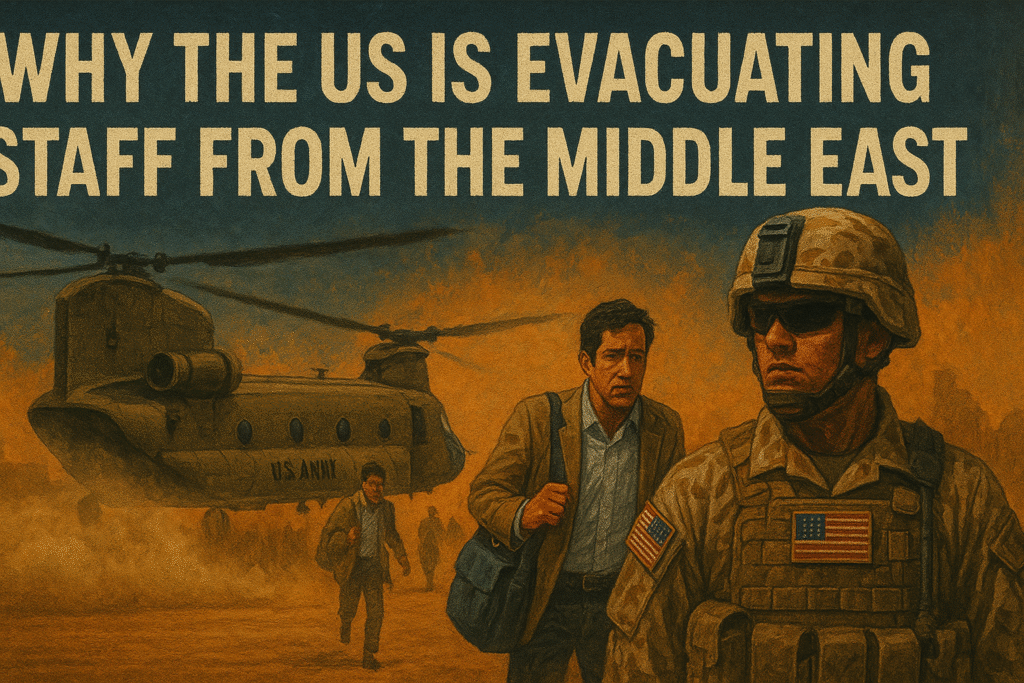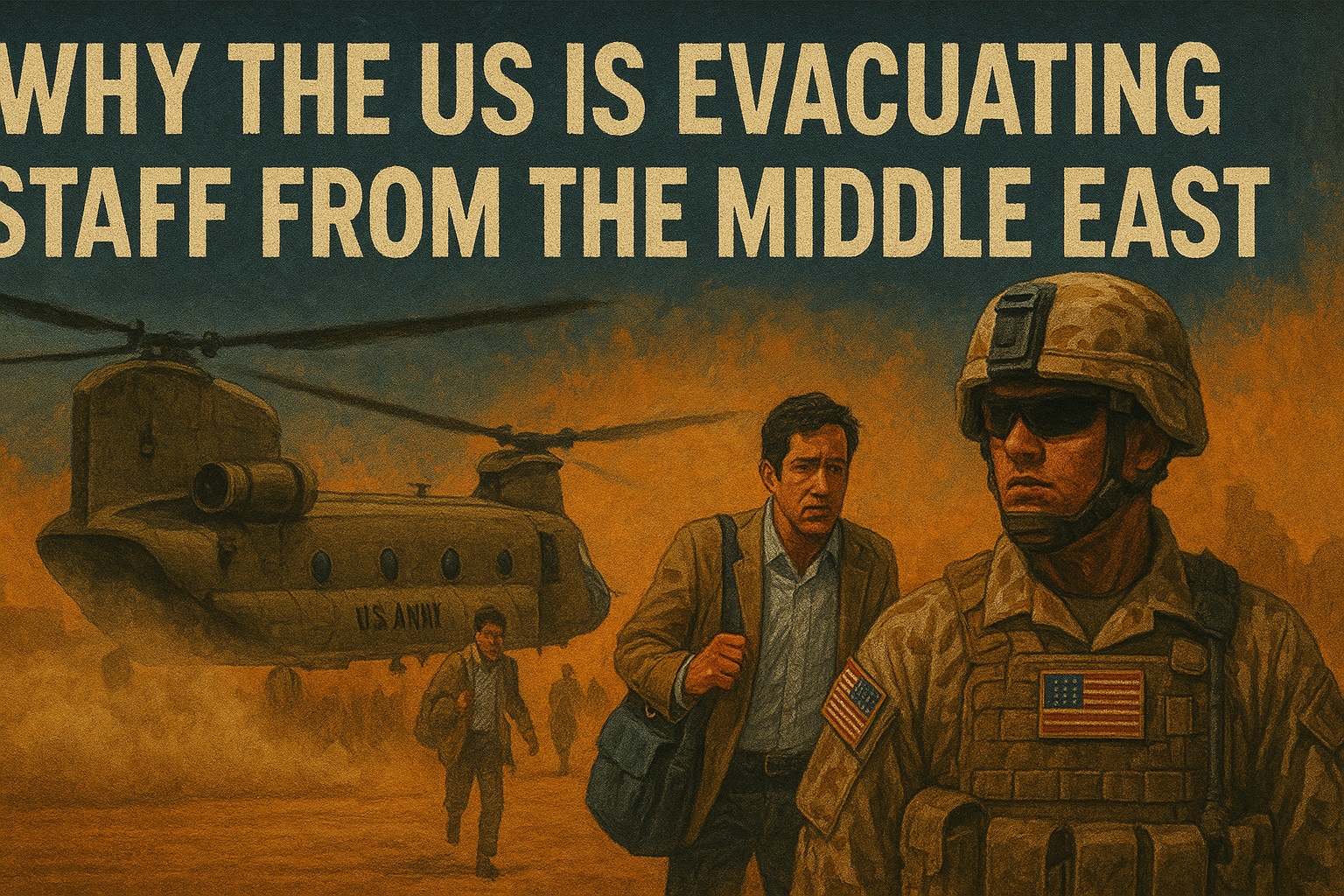US Evacuates Staff in Middle East Amid Fears of Israeli Strike on Iran
Amid rising tensions in the Middle East and fears of a potential military escalation involving Israel and Iran, the United States has initiated a partial evacuation of diplomatic staff and military dependants from several key locations across the region.

Key Developments:
- Embassy Evacuation: The US State Department has ordered the voluntary departure of dependants of American personnel from its embassies in Iraq, Bahrain, Kuwait, and the United Arab Emirates. This decision underscores growing security concerns in light of recent developments.
- CENTCOM Statement: The US Central Command (CENTCOM) confirmed that Defense Secretary Pete Hegseth authorized the withdrawal of military dependants in the region. CENTCOM emphasized that it is “monitoring the developing tension.”
- Focus on Baghdad: The US Embassy in Baghdad, already operating with limited staffing, has been included in the evacuation orders. Non-essential personnel are being relocated as a precautionary measure. The Department of State cited a “commitment to keeping Americans safe, both at home and abroad.”
- Presidential Comments: US President Donald Trump addressed the situation on Wednesday evening, describing the region as potentially “dangerous.” Trump reiterated a longstanding US stance, declaring, “They can’t have a nuclear weapon, very simple. We’re not going to allow that.”
Tensions Over Iran’s Nuclear Program
- Stalled Nuclear Talks: Negotiations between the US and Iran over Tehran’s nuclear program appear to be at an impasse. The proposed sixth round of talks, aimed at placing limits on Iran’s nuclear development in exchange for lifting economic sanctions, is tentatively scheduled for this weekend in Oman.
- Iranian Counterproposal Expected: Iran has signaled its intention to present a counterproposal via diplomatic channels in Oman. This comes as Israeli officials warn they are fully prepared to launch a military strike against Iran, a development that has reportedly alarmed Washington.
- CBS Report: According to a report by CBS News, US officials have been informed that Israel is “fully ready” to attack Iranian nuclear facilities. The US anticipates that such an attack could provoke retaliation from Tehran, potentially targeting American assets in neighboring Iraq.
Iran’s Reaction and Warnings
- UN Statement: Iran’s mission to the United Nations released a statement reiterating that the country is not pursuing nuclear weapons. The statement added, “US militarism only fuels instability,” and warned that “threats of ‘overwhelming force’ won’t change the facts.”
- Call for Diplomacy: Iran emphasized that “diplomacy – not militarism – is the only path forward,” advocating continued negotiation over confrontation.
- Defence Minister’s Warning: Iranian Defence Minister General Aziz Nasirzadeh delivered a stern warning in a press conference, saying, “If conflict is imposed on us, the opponent’s casualties will certainly be more than ours.” He emphasized Iran’s capability to target all US military bases in the region if provoked.
“America must leave the region, because all its bases are within our reach. We will target all of them in the host countries without hesitation,” Nasirzadeh warned.
Regional Reactions and Strategic Implications
- Strategic Evacuations: The partial withdrawal of personnel indicates that the US is bracing for the possibility of retaliatory actions in the region. This precautionary step also sends a message to Iran and other actors about the seriousness of the potential threat.
- Past Precedents: This is not the first time the US has ordered such evacuations. The embassy in Baghdad, in particular, has faced threats before, especially from Iran-aligned militias in Iraq. Previous partial evacuations were also prompted by heightened tensions with Tehran.
- Political Maneuvering or Preemptive Action?: Al Jazeera’s Washington correspondent Alan Fisher noted that while the evacuation may stem from genuine security concerns, it could also be intended to exert diplomatic pressure on Iran. “Clearly, there is some concern that the discussions with the Iranians aren’t going well. Or, it could be that this is all designed to put pressure on Iranians,” Fisher said.
- History Repeating Itself: The geopolitical landscape appears eerily reminiscent of past standoffs, with aggressive posturing from both sides threatening to spiral into open conflict. This comes at a time when regional dynamics are especially volatile.
Diplomatic Deadlock and the Path Ahead
- The Next Round of Talks: Despite the tensions, diplomatic channels remain open. The sixth round of US-Iran negotiations is reportedly still on the agenda, with Trump’s Middle East envoy Steve Witkoff scheduled to attend.
- Prospects for Resolution: Analysts suggest that much depends on whether the proposed counterproposal from Iran offers sufficient concessions to satisfy US concerns over its nuclear ambitions. The coming days will be critical in determining whether diplomacy can avert a larger conflict.
- Public Messaging: Both sides have used public platforms to frame the narrative. While Trump emphasizes deterrence and military readiness, Iranian officials have focused on sovereignty and self-defense.
“Iran is not seeking a nuclear weapon,” the Iranian UN mission emphasized, framing the current US actions as escalatory.
Conclusion
The United States’ decision to evacuate personnel from key Middle Eastern embassies underscores the seriousness of the growing tensions surrounding Iran’s nuclear ambitions and the potential for Israeli military action. With diplomacy hanging in the balance and both sides issuing stern warnings, the next steps could determine whether the region veers toward resolution or confrontation.
For now, all eyes turn to Oman, where the next round of negotiations may decide the fate of peace in a region long defined by its volatility.

One thought on “US Evacuates Staff 200+ from Mideast Amid Threats”
Comments are closed.